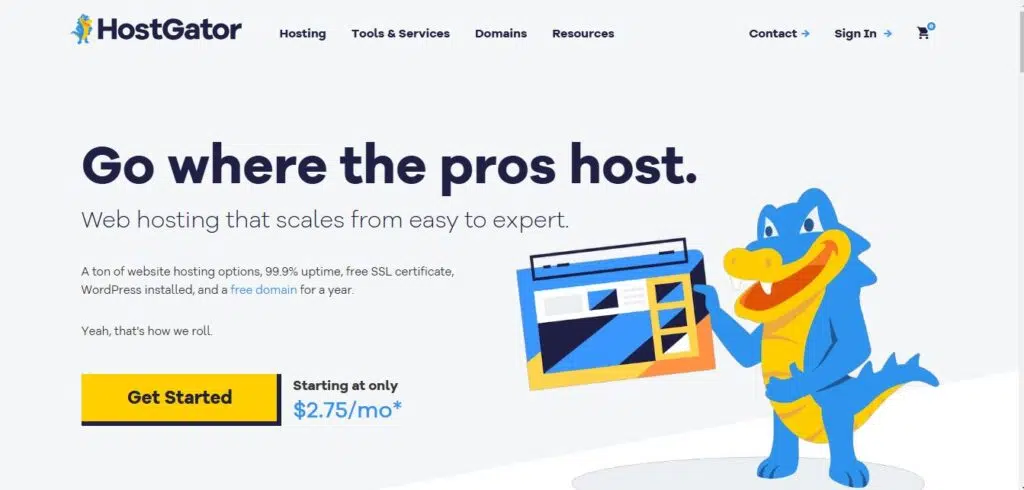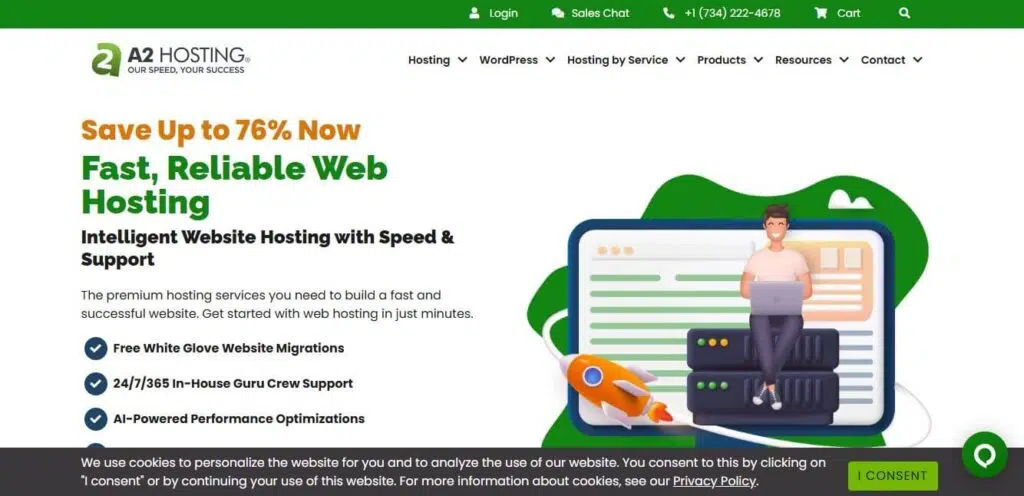Table of Contents
ToggleWhat is Web Hosting? Beginner’s Guide to Understanding the Best Web Hosting
After years of researching the best hosting options and gaining hands-on experience, I’ve learned that web hosting is one of the most critical aspects of making a website accessible online. Essentially, web hosting is like renting space on the internet; it’s where all the files of your website live. With reliable web hosting, you ensure that your site loads quickly stays secure, and performs well—all factors that can directly impact your search rankings. Choosing the right hosting is an investment in your site’s visibility and success.
Understanding Web Hosting vs. Domain
One common question is the difference between web hosting and a domain name. Think of the domain as your website’s address, while web hosting is the actual space where your site’s data is stored. In real-world terms, your domain name helps people find your site, but without hosting, there’s nothing to show. Both work together—hosting makes your website accessible, and the domain provides a recognizable name so users can easily locate it online.
How Web Hosting Works
At a basic level, web hosting involves servers, which are powerful computers that store website data and files. When someone types your website’s URL into their browser, their computer connects to the hosting server, retrieving the necessary files and displaying your website. Servers are always online, ensuring your site is accessible 24/7. The process might sound technical, but reliable hosting providers make it simple by handling the details so you can focus on running your website.
Different Types of Web Hosting: Top 4 Options
When choosing a web hosting plan, here are the four main types you’ll encounter:
- Shared Hosting: Ideal for beginners, this option hosts multiple websites on one server. It’s budget-friendly but may slow down during high traffic.
- VPS Hosting (Virtual Private Server): Offers more control and resources than shared hosting, making it suitable for growing sites.
- Cloud Hosting: Highly scalable and reliable, cloud hosting uses a network of servers, offering flexibility and better uptime.
- Dedicated Hosting: The most advanced option, dedicated hosting gives one site exclusive access to a server. Perfect for large businesses or sites with heavy traffic.
Each type offers unique benefits, so it’s worth considering your website’s size and needs before deciding.
Web Hosting Costs: What to Expect
Web hosting costs vary widely based on features and resources. For personal or small business websites, shared hosting plans are affordable, often starting at $3–$10 monthly. Mid-tier options like VPS and cloud hosting range from $20 to $80 per month, offering more performance for growing sites. For large businesses, dedicated hosting costs can reach $100+ monthly but offer maximum control and resources. Assess your budget, business needs, and long-term goals to pick the right plan.
Finding the Best Web Hosting Provider
When choosing a web hosting provider, prioritize performance, customer support, and security features. I recommend international providers based in the USA or Europe since they often deliver higher-quality services than some local providers in South Asia or Africa. Look for providers offering a strong uptime guarantee, daily backups, and a secure hosting environment. Customer support should be responsive and available 24/7—especially important if you’re new to hosting and may need guidance. Additionally, check for essential features like SSL certificates and user-friendly control panels.
This guide sets the foundation for understanding web hosting, from its basics to choosing the right provider. By finding quality hosting, you set your website up for better performance, security, and potential ranking improvements—an investment that pays off as your online presence grows.
Top 10 Web Hosting Providers in 2025
Choosing the right web hosting provider can set the foundation for your website’s performance, security, and overall success. In 2025, these ten providers stand out for their range of services, reliability, and customer support. Here’s a closer look at each one, highlighting their features, security measures, performance, and support quality.
1. Bluehost
- Performance: Known for its excellent uptime and load times, Bluehost is ideal for beginners and WordPress users.
- Security: Includes free SSL certificates, daily backups, and a security suite for malware protection.
- Customer Support: 24/7 support via live chat, phone, and email.
- Pricing: Plans start at around $2.95/month, with competitive options for beginners and mid-sized websites.
2. HostGator
- Performance: Reliable speed and uptime, with a range of scalable options.
- Security: Offers SSL, automated backups, and server monitoring.
- Customer Support: 24/7 customer service with a responsive support team.
- Pricing: Shared hosting starts around $2.75/month, with affordable upgrades for VPS and dedicated hosting.
3. A2 Hosting
- Performance: Known for its high-speed Turbo servers, ideal for speed-optimized sites.
- Security: Free SSL, virus scans, and DDoS protection.
- Customer Support: 24/7 “Guru Crew” support with a knowledgeable team.
- Pricing: Starts at $2.99/month, with pricing options suited for small to large websites.
4. SiteGround
- Performance: Excellent uptime and quick load times make SiteGround popular among WordPress users.
- Security: Free SSL, daily backups, and proactive server monitoring.
- Customer Support: 24/7 support with rapid response times and knowledgeable agents.
- Pricing: Shared hosting starts at $3.99/month, with a range of scalable plans.
5. InMotion Hosting
- Performance: High-quality performance and excellent speed.
- Security: Includes SSL, malware protection, and spam filtering.
- Customer Support: 24/7 support, known for professional and helpful agents.
- Pricing: Shared hosting starts at $2.99/month, with options for VPS and dedicated hosting.
6. DreamHost
- Performance: Consistent uptime and decent loading speeds.
- Security: Free SSL, domain privacy, and backups.
- Customer Support: 24/7 support with a focus on WordPress-related issues.
- Pricing: Basic plans start at $2.59/month, with options for scalable hosting.
7. GoDaddy
- Performance: Reliable uptime, with solid options for small businesses.
- Security: SSL, DDoS protection, and site backups.
- Customer Support: 24/7 support with global availability, but response times may vary.
- Pricing: Starts at $5.99/month, with a variety of business-focused plans.
8. GreenGeeks
- Performance: Fast servers and eco-friendly hosting.
- Security: SSL, nightly backups, and malware scans.
- Customer Support: 24/7 support with environmentally-conscious practices.
- Pricing: Shared hosting starts at $2.95/month, with a focus on sustainability.
9. Liquid Web
- Performance: Premium hosting for large sites needing high performance.
- Security: SSL, backups, malware scans, and firewall protection.
- Customer Support: Known for managed support with a high level of expertise.
- Pricing: Starts at $19/month, with high-tier dedicated and cloud options.
10. WP Engine
- Performance: Optimized for WordPress with rapid load times.
- Security: SSL, automated updates, and malware scanning.
- Customer Support: 24/7 support, specializing in WordPress.
- Pricing: Premium plans start around $20/month, tailored for WordPress professionals.
Key Features Comparison
- Security Features: Each provider offers SSL certificates, though some like Liquid Web and WP Engine provide more advanced security with firewall protection and automatic updates.
- Control Panels: Most providers use cPanel, a user-friendly control panel, except DreamHost and WP Engine, which have custom-built dashboards specifically designed for their hosting environments.
- Customer Support: All ten providers offer 24/7 support, but some, like Liquid Web and SiteGround, have higher user ratings for response speed and expertise.
- Additional Services: Backups, SSL certificates, and domain management are standard across providers. Some also offer premium backups, malware protection, and DDoS prevention.
Introduction to Cloud Hosting
Cloud hosting is a modern hosting solution that uses a network of interconnected servers to host websites. Unlike traditional hosting, which relies on a single server, cloud hosting distributes data across multiple servers, making it scalable, reliable, and flexible for growing businesses.
Web Hosting vs. Cloud Hosting
Traditional web hosting typically involves hosting a website on one server, such as in shared, VPS, or dedicated hosting. In contrast, cloud hosting offers greater flexibility by allowing resources to scale dynamically. This approach ensures your website can handle sudden traffic spikes, making it ideal for larger or growing sites.
Web Hosting and Cloud Hosting Differences
Cloud hosting’s biggest advantage is scalability; you only pay for what you use, and resources can be added or removed based on demand. Web hosting is usually more cost-effective and suitable for smaller websites or personal blogs. Cloud hosting, with its flexibility and enhanced reliability, is better for businesses needing consistent uptime and speed. Traditional web hosting works well for smaller sites with steady traffic, while cloud hosting is preferable for businesses expecting fluctuating traffic or fast growth.
How Cloud-Based Web Hosting Works
Cloud hosting relies on multiple interconnected servers to host websites, rather than just one. This setup enables dynamic scalability, with resources allocated based on demand. It’s popular because it offers higher reliability, as even if one server fails, others can keep the site running, making it ideal for businesses with growing or fluctuating traffic.
Exploring Google Cloud Web Hosting
Google Cloud is a leading cloud hosting provider known for its scalability, speed, and global data centers. It offers unique advantages like customizable storage and networking options, advanced security, and seamless integration with Google’s other services, making it a strong choice for businesses needing flexible, enterprise-level solutions.
Cloud Computing vs Web Hosting
Cloud computing encompasses a broad range of services, from data storage to application hosting, while web hosting specifically provides space for websites. In web hosting, servers are primarily configured to display websites, while general cloud computing also includes software, storage, and network management, catering to more diverse needs.
What is a CDN in Web Hosting?
A Content Delivery Network (CDN) is a system of distributed servers that delivers web content from the server closest to the user’s location. This reduces load times and improves website performance. CDNs are especially useful for global sites, as they ensure consistent loading speeds and lower latency across regions.
How Reseller Web Hosting Works
Reseller hosting allows entrepreneurs to sell hosting services by purchasing server space from a provider and dividing it among their clients. Resellers can create their hosting packages and pricing, making it an excellent way to start a hosting business without maintaining the servers themselves, catering to small businesses or freelancers.
Shared Web Hosting: How it Works
In shared hosting, multiple websites share a single server, making it a cost-effective option for smaller sites. It offers basic performance, but as sites grow, resources can become limited. For large sites or those with high traffic, shared hosting’s limitations—like slower speeds during peak usage—make it less ideal.
VPS (Virtual Private Server) Hosting
VPS hosting gives websites their private section of a server, unlike shared hosting, where resources are shared among all users. VPS provides more control, higher reliability, and greater resource allocation, making it a better choice for sites needing a balance of performance and cost-effectiveness.
Dedicated Hosting
Dedicated hosting means a website has an entire server to itself, providing maximum control, performance, and security. It’s best for high-traffic sites or businesses needing extensive customization. With dedicated resources, it’s often used by large websites, eCommerce stores, or businesses with advanced hosting requirements.
WordPress Hosting
WordPress hosting is optimized specifically for WordPress sites, with pre-configured settings for better performance and security. It usually includes one-click installation, caching, and automatic updates, making it ideal for users seeking an easy and efficient way to run a WordPress site with minimal technical requirements.
Understanding Web Hosting Services and How They Operate
Typical web hosting services include backups to prevent data loss, SSL certificates for secure data encryption, and email hosting for business communication. Providers usually offer an uptime guarantee, often 99.9% or higher, to ensure website reliability. The infrastructure and customer support vary across services, impacting performance and stability.
What is Reseller Web Hosting and Its Benefits?
Reseller hosting allows entrepreneurs to create their hosting businesses by selling server space. It’s ideal for digital agencies, freelancers, or businesses that want to offer hosting to clients without server management. With low startup costs and recurring revenue potential, it provides a scalable business opportunity.
Free vs. Paid Web Hosting – Which is Right for You?
Free hosting is budget-friendly and good for simple sites or beginners, but it often includes ads and has limited features. Paid hosting provides more reliability, better performance, and essential services like customer support, security, and backups, making it more suitable for professional or business websites.
Related Guides and Resources
Explore more on topics like web hosting comparisons, in-depth guides on server management, and detailed reviews of hosting providers. These resources are ideal for beginners and professionals alike, offering valuable insights into selecting, optimizing, and managing your web hosting service.
Tips for Website Security and Performance
To enhance website security, ensure SSL certificates are active, regularly update software, and use firewalls. Performance tips include using CDNs for speed, minimizing image sizes, and enabling caching. Prioritizing both security and performance improves user experience and helps maintain a trustworthy online presence.
Customer Reviews
Here are top reviews from business owners who have benefited from hosting with the providers I recommend:
“Switching to this hosting improved my site speed and boosted sales!”
Maya, Digital Marketer
“Customer support is exceptional—they helped me optimize my site’s performance.”
Liam, Blogger
“Affordable hosting with excellent uptime; my audience is growing daily.”
Sophia, Agency Owner
“Their security features are top-notch. Perfect for client projects!”
John, Startup Founder
“Fast, reliable, and packed with features I never thought I’d need.”
David, eCommerce Owner
FAQs About Web Hosting
- Is it Necessary to Buy Hosting?
Yes, hosting is essential for making a website accessible online. - How Much Does it Cost to Host a Website?
Prices vary by hosting type, from a few dollars monthly to premium rates. - Can I Host My Website for Free?
Free hosting is available but has limitations like ads and low resources. - What’s the Difference Between Shared and VPS Hosting?
Shared hosting shares resources, while VPS provides private space for better performance. - Is Cloud Hosting Better for Growing Businesses?
Yes, cloud hosting scales easily to meet increased traffic needs. - Do Hosting Providers Offer Security Features?
Most offer SSL, firewalls, and malware protection for website security. - How Important is Uptime for My Website?
Uptime is crucial; high uptime ensures your site is always accessible. - Can I Switch Hosting Providers Easily?
Yes, most providers offer migration assistance to simplify switching. - What Does ‘Bandwidth’ Mean in Hosting?
Bandwidth is the amount of data your site can transfer to visitors. - Does Location Affect Hosting Speed?
Yes, hosting closer to your audience often improves speed. - Is Domain Registration Separate from Hosting?
Yes, though some hosting providers offer bundled domain registration. - How Do I Manage My Hosting?
Hosting providers typically offer control panels like cPanel for easy management. - Do I Need a Hosting Plan for Email Services?
Many providers include email hosting in their plans. - Can I Use My Existing Domain with New Hosting?
Yes, you can transfer or point your domain to a new host. - What is SSD Hosting?
SSD hosting uses faster storage drives, improving website speed and performance.
Key Takeaways for Choosing Web Hosting
When choosing a web host, focus on uptime reliability, speed, and security features to ensure your site performs at its best. Whether you’re a business owner, blogger, or freelancer, the right hosting can make a significant impact on your online success. Customer support, scalability, and included services like SSL certificates should also play a role in your decision.
For more resources, visit my blog, where I offer insights on hosting, digital marketing tools, and software solutions. I’m available for personalized consultations via chat or Google Meet—just reach out for guidance on any tool or digital marketing service you may need. Thank you for reading!
Hi, I’m Fahim — a SaaS tools reviewer and digital marketing expert with hands-on experience helping businesses grow using the right software. I research, test, and personally use a wide range of AI, business, productivity, marketing, and email tools for my agency, clients, and projects. I create honest, in-depth reviews and guides to help entrepreneurs, freelancers, startups, and digital agencies choose the best tools to save time, boost results, and scale smarter. If I recommend it, I’ve used it — and I only share what truly works.




















